COVID-19 Service Station Updates
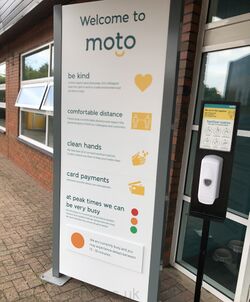
The COVID-19 pandemic had a massive impact on every industry, including motorway service areas. They remained open throughout, but they had to adapt to unusual and challenging trading conditions.
This page, which originally broke down the changes that road users needed to know, now remains to retell how the industry reacted to the pandemic.
Early Build-Up
In early March 2020, everybody (including road users) would have been aware of the problems the pandemic was causing abroad, and of the importance of practising good hygiene and social distancing. The British government had released its Coronavirus action plan on 3 March, but most people will only remember Boris Johnson's summary of it: "wash your hands and business as usual".
On 10 March, Applegreen were thought to be the first operator to publicly mention COVID-19.
Roadchef later mentioned the importance of hygiene and Circle K introduced an offer for health workers. The tone of their communications still didn't hint at any disruption ahead.
On 12 March, the Irish government announced the closure of all schools and Boris Johnson made a chilling statement about deaths, but from the perspective of the road transport industry, there was still no public indication that major disruption was ahead. Events like Cheltenham Festival were still filling service stations with thousands of customers.
The first it started to become public and clear that major changes were going to happen in every industry was on 16 March 2020, when Ireland's Taoiseach made a speech advising that unprecedented times were ahead. This was also the date that we received reports that service stations in France were closing, although these aren't necessarily comparable to the big British service stations.
On 17 March, McDonald's announced that following "UK and Irish government updates", all of their branches would be takeaway and drive thru only. This meant Roadchef and Circle K had to remove seating areas, while most A-road service station branches locked their doors completely.
On 18 March, Roadchef were the first major British operator to speak about COVID-19, advising that they were open and quieter than usual. Westmorland also advised similarly. Service stations had been stepping up their hygiene procedures, but reported that soap and hand sanitiser was being stolen.
Over the following days Moto and Roadchef announced discounts for health workers.
On 20 March, the British Prime Minister announced that all sit-down restaurants were going to have to close that night. Reports suggest that at least some operators were surprised by this announcement, and had so far been advised that the situation wasn't that serious. Earlier that day, the Prime Minister had advised that he would be travelling to visit his family.
Declaring A Lockdown
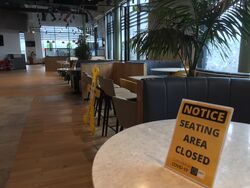
While food stores were still allowed to open as takeaways, many big brands figured that they didn't want to be forcing their staff to work. Of course, whether that was for moral, PR or financial reasons will vary by brand. Most service station restaurants are run as franchises, which might have meant they could still open, but in some cases the brand didn't want to be seen to be open and were quite forceful about it.
Over the next few hours Starbucks, McDonald's, Costa, Greggs and Subway are some of the firms (of interest to us) who announced closures. Service station food offers became takeaway only, and game arcades were closed. Welcome Break initially advised that Starbucks drive thrus would still be open.
Customer reaction was mixed: complaints were received that the offering was too much and put profit before safety, while others (especially lorry drivers) complained that the offering was too small. Moto later explained that the closures were necessary to allow them to "reconfigure their kitchens".
Things changed again on 23 March, when the British Prime Minister announced the so-called 'lockdown'. KFC, Wild Bean Cafe, Burger King and Supermac's announced closures. British service stations confirmed that their shops were going to be their main food offering.
There was confusion and concern among HGV drivers. Some had already experienced being refused access to toilets and showers at non-motorway sites, especially delivery addresses. Now Roadchef had been accused of doing the same. They later advised that they were reviewing their cleaning processes, and that there had been an internal misunderstanding. Reduced HGV parking prices were introduced.
Behind the scenes, Highways England and the Department for Transport were communicating with all British service station operators about what facilities were available. There were some reports that they were unhappy with what service stations were doing, but evidently an agreement was reached.
Transport Focus, the industry's new watchdog, made a blog post about the events, and Highways England created a spreadsheet of facility closures. The latter received considerable media exposure, although it never actually provided any updates.
Despite the initial confusion and internal panic, by now things appeared to have settled down. Most service stations were trying to provide petrol stations, toilets and showers, and a shop and/or grocery store. They faced frequent and justified dissatisfaction for not selling more food, but they argued that they were having to contend with health advice, the closure of their brand partners and a phenomenal drop in trade - quoted as being up to 85% less than usual.
Some service areas were having issues with staff shortages (with Bothwell being frequently named), but most were over-staffed and placed most of their staff on the government's furlough scheme. Internal sources also told us that some staff were unhappy with the amount of abuse they were receiving from the public.
Over the Easter Bank Holiday, Motorway Services Online reported that its page views were around 2/3rds below their usual level. The actual fall in road users would be much more than that, but our figures include enquiries and people who are reading from home.
The New Normal
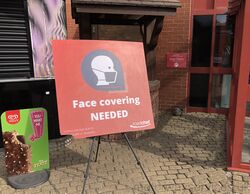
The settled situation lasted for a few weeks. By mid-April, all three of the large operators were reporting issues. Their premium grocery stores, despite being the main food offering, were receiving very little custom. They all announced that up to 70% of these would be closing, while they investigate other options.
In the last week of April, Moto began a new campaign to win over disgruntled HGV drivers. A small hot food menu to some of their WHSmith stores, free of charge to those who had paid for parking, available under the slogan 'Hot Meals Matter'. The free parking allowance was increased, and HGV drivers were offered free coffee from Costa Express. Roadchef followed with similar offers.
By May, many fast food brands were looking at opening their city centre locations, mainly for delivery. This didn't impact service stations, but Moto did open one Costa drive thru.
On 10 May 2020, the UK government relaxed restrictions on car travel (although there was considerable debate over whether this applied outside England). Motorway Services Online reported an immediate increase in queries; up more than double the previous week. BP announced a plan to reopen their Wild Bean Cafés and hotels were provisionally taking bookings.
In Ireland, McDonald's announced their plan for reopening, although rivals Burger King had kept some of their branches open, and Supermac's had recently reopened some. Subway then announced that they were returning.
On the evening of 13 May, Moto and Welcome Break both made steps towards returning to normal, with Moto announcing a plan to reintroduce Burger King, and Welcome Break announcing the immediate reopening of some Starbucks Drive Thrus and KFCs. Within a week, a number of food brands at both operators had reopened, with Roadchef opening Costa Drive Thrus on 21 May. The highly anticipated opening of a small number of McDonald's Drive Thrus happened on 20 May, including the branches at Bobbing Corner and Boreham.
By the end of May, most service areas in England had some-sort of food brand. McDonald's had opened all their drive thrus in Britain and Ireland by 4 June 2020. Other takeaway restaurants opened throughout June, with most of the big brands open by the end of the month. Roadchef designated Strensham southbound as their trial site for testing reopenings and social distancing measures.
Roadchef were the first operator to add a "current status" icon to their website, and partnered with Goodtill to launch an online ordering service. Moto and Welcome Break soon trialled their own online ordering systems.
At the end of the month Applegreen told the press that traffic levels were down 65% on the previous year (presumably measured using Welcome Break footfall).
A Good Summer
On 4 July England removed many of its restrictions. As service areas are already selling food, there is no rush to get restaurants open, but some socially-distanced dining areas will be introduced. Mask wearing became the topic of conversation, with Scotland making it mandatory, and England and Ireland phasing it in, albeit with some confusion over whether food or fuel sales should be treated like shops. Reception to the news was mixed: most people were happy to wear a mask and expected to see staff enforcing the rule, while others expected to see more or less enforcement.
On 17 July 2020, Moto announced a "fuel price drop", in what was perhaps the first real sense of "normality", with a promotion not related to COVID-19. They explained that traffic levels were still 20% less than the same time the year before, and that they were making 50 compulsory redundancies as a result. The government's significant reduction in VAT charged on hot food encouraged some service areas to lower their prices.
The start of August was a real test, with more people than usual heading on holiday in the UK. Service stations on holiday routes had to introduce queues, though most visitors appeared to be satisfied. Where complaints were received, they were often incensed. The government's "eat out to help out" scheme, which halved the price of food when purchased to eat in, was extremely well received even if many commented that it had merely made the inflated prices appear acceptable.
At the start of September, service stations reported that their summer had been busier than ever before. Almost all stores were now open, albeit with some changes such as Welcome Break's new unit, The Good Breakfast. The wider hospitality industry had been gutted, with organisations like Whitbread (Premier Inn, Costa, Beefeater) planning to cut up to 1/5 of their jobs.
New Problems
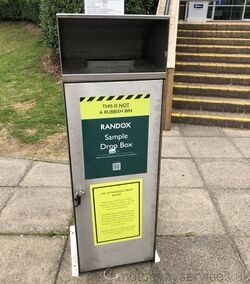
After many regional restrictions had been applied, new national restrictions were applied across Britain on 24 September 2020. These did not mean much change for the industry's strategy, although they have applied further pressure to smaller and struggling chains. There was confusion as the Department for Transport advised motorists to only visit service stations "if you really need to", while the government's advice stated that visitors should merely "limit the time they spend there". The leaflets were quickly removed.
Increasingly severe restrictions were applied during the autumn, usually on a town-by-town basis. Local bans on indoor dining were common, though service areas were always exempt. During October, Ireland, Northern Ireland, Scotland and Wales all separately opted to enforce a so-called 'circuit breaker', where severe travel restrictions were applied for a short period. Service areas were braced for another drop in trade, albeit not as severe as last time.
England finally joined the others with a stricter lockdown that began on 5 November. Again, "motorway service areas" and "petrol stations" were both specifically exempt, though A-road service areas were not. This meant sit-down restaurants were permitted to open inside motorway service areas, but not the ones attached to A-road service areas, although takeaway and drive thru facilities were also allowed to remain open.
In practice, motorway traffic levels did not drop significantly this time, and while some shops and fast food brands were closed, most motorway service areas took the disruption on the chin and continued as they had done.
Maidstone was the only motorway service area known to have managed a COVID-19 outbreak among its own staff, which was quickly resolved with the short closure of one unit.
There was more confusion in December. Initially restrictions were relaxed, and the impression was that the roads and airports would be very busy over Christmas. However at the last moment a surge in cases caused restrictions to be tightened again. Instead, service areas did a good trade with separated parents and families arranging a quick, distanced meeting, but long distance travel was effectively banned. The situation deteriorated further into 2021, with a long ban on travel that left the roads much quieter. Service areas were used to it by now, and were able to operate a reduced service.
Meanwhile, having generated all the positive publicity they needed, Highways England removed their spreadsheet of MSA closures, and instead directed road users to this website.
The Long Winter
The early 2021 lockdown dragged on, even though this is traditionally the quietest period for motorway service areas anyway. The budget hotels saw enough trade to reopen some more branches during February, but there was no hope for hospitality. In Scotland, the restrictions were much more severe: tables were removed from seating areas, and Bothwell operated with a part-time WHSmith as its only branded facility.
Considerable tension built up around the restrictions at service areas in England. Many people shared pictures of busy dining areas, with some arguing that it went against the spirit of the lockdown, and others arguing that it proved that the rules were unfair on smaller businesses.
Many others made a point of making trips to service areas and sharing their delight at what they called "a taste of normality", while road users still shared pictures of empty service areas which they felt were treating them poorly, especially in Wales and Scotland.
At Leeds, the local police began making visits to the service area in March 2021, and told local residents that the theory that this was a lockdown loophole was a myth. Some commenters argued that most of the offending customers were gathering outside where the risk was minimal.
Through a mixture of an increased number of essential journeys, and perhaps less stringent adherence to the restrictions, traffic levels began to rise during March. Attention moved towards the easing of restrictions on 12 April, where Roadchef said they were "excited by the outlook for UK tourism", and recruited 1,000 members of staff in preparation to reopen all units. However, other operated had used the various lockdowns to reflect on their operations and implement permanent closures, resulting in the loss of many branches of Subway, El Mexicana, Regus Express and many more.
Descending Into Chaos
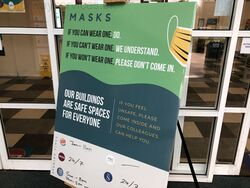
England reopened rapidly, and by the end of May most service areas had returned to normal, while traffic levels were very high every day of the week. Traffic levels over the late May Bank Holiday (and following half term) were extremely high, with queues reported at the entrance to several service areas, and staff reporting very high sales levels. Traffic levels on holiday routes remained extremely high all summer. It became very clear that while all service areas suffered financial losses during the lockdowns, their sales were now reaping the rewards. Smaller sites which rely more on fuel sales were recovering more slowly.
The UK removed most of its social distancing advice on 19 July. The summer continued to be busy, with customers giving a mixed response to the new restrictions. Some operators still requested face coverings, while others merely advised them. All found the restrictions difficult to enforce following the government's lack of support for them. Despite the apparent optimism, case rates remained high, especially among younger people. Some service areas experienced staff shortages, while the press focused on allegations that one service area was telling staff to ignore isolation advice.
Some of the brands at service areas were thrown into a so-called culture war at the end of July, after a number of high profile commentators shared photos of signage in Ireland, where proof of vaccination had become a legal condition of indoor dining. These commentators implied that the signage was from England, and led calls for visitors to boycott these brands. Many readers were confused because service stations in England had permitted indoor dining throughout the pandemic, and this situation hadn't changed.
For service areas, the summer was a big success. There were no major issues and custom remained extremely high, with some sites believed to be hitting their all-time sales record. With more optimism than last year, they were able to experiment with new ideas, with Roadchef launching a series of outdoor stands and entertainment, while Moto focused on their new, more personable branding.
Looming over their shoulder was the staffing crisis. Due to the combined affects of both Brexit and Covid encouraging employees from outside the UK to return home, frontline jobs were struggling to find any staff. This was affecting service areas directly, but much more importantly, when combined with other economic issues it made receiving deliveries very difficult. Many brands announced shortages of their products, which affected service area franchises too.
There was increasing concern for what this would mean for fuel deliveries. When BP put some steps in place to manage their supplies, the media soon covered it and nationwide panic buying begun immediately. Sheer chaos unfolded, with reports of people queueing for hours, and long strings of consecutive service areas running out of fuel, which the electronic signs were trying to keep up with. Traffic officers were having to close slip roads, while social media showed images of cars trying to use HGV pumps and reports of cars filling up with AdBlue in desperation for something.
Despite government assurances that things were getting better, extreme disruption lasted for two weeks, leaving long gaps like no service areas selling petrol between Dover and Telford. Things were especially bad in the south east, while a total of 64 motorway forecourts reported themselves running out of fuel. The actual figure was probably much higher.
Once the fuel situation had stabilised, there was a brief period of normality, before the new Omicron variant caused a new surge of cases, especially in England. The new wave struck in the lead-up to the Christmas period, meaning that for service areas another peak trading period was going to be a damp squib. High levels of staff absence caused further issues.
While the latest strain spread fast, causing consumer concern and leaving many Christmas plans in tatters, it was also over relatively quickly. By mid-January, there was new-found optimism in Ireland and England, as a positive future was forecast. Regulations were again removed in England, and all the floor markings were removed. The Department for Transport's HGV driver testing locations were closed on 31 March 2022.
Restrictions were then removed in Ireland, Wales, Northern Ireland, with Scotland removing its final regulations in April 2022. Some service station customers continued to show nervousness in the very busy buildings, especially with new variants still being found, but most people seemed eager to move on. The topic of conversation had largely moved on to the cost of living and, on the motorways, shortages of diesel, both of which were partly influenced by the pandemic but were clearly changing how people behave.